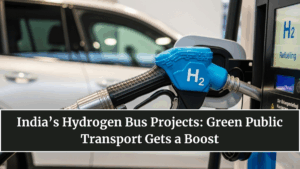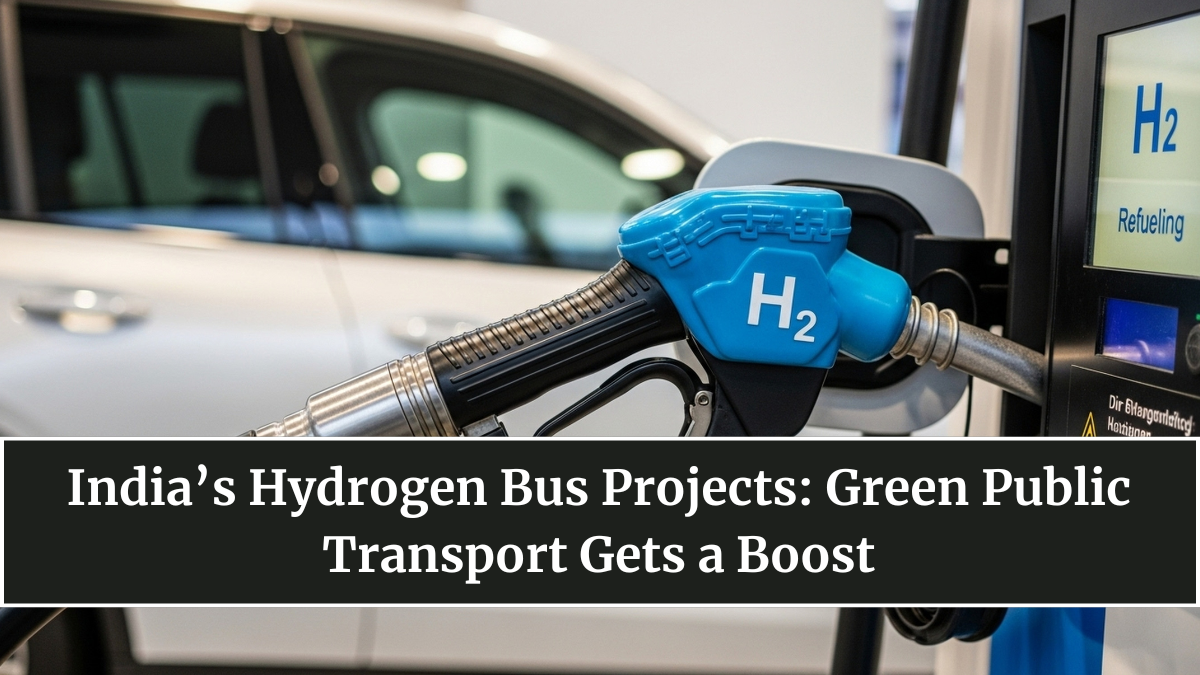India’s journey toward clean mobility has entered a bold new phase with the rollout of hydrogen-powered buses across major cities. As the country accelerates its transition to sustainable transport, these next-generation buses are emerging as a zero-emission alternative to diesel and even electric fleets.
In 2025, the focus has shifted from experimentation to implementation — public transport systems are now integrating hydrogen buses on real routes. From Delhi to Pune and Bengaluru, India’s hydrogen mobility vision is finally taking shape, combining innovation, efficiency, and environmental responsibility.

Why Hydrogen Buses Are the Next Step After EVs
While electric buses have reduced emissions, they still rely on lithium batteries, which face challenges like long charging times and recycling issues. Hydrogen fuel cell buses, on the other hand, convert hydrogen and oxygen into electricity through a chemical reaction, producing only water vapor as exhaust.
This makes them not just clean, but ultra-sustainable, capable of covering longer distances and refueling within minutes.
Key advantages include:
-
Zero tailpipe emissions: Only water vapor is released.
-
Quick refueling time: Takes 10–15 minutes compared to hours of EV charging.
-
Extended range: Up to 400–600 km per fill.
-
High efficiency: Ideal for long-distance and intercity public transport.
These advantages position hydrogen buses as a crucial complement to battery EVs, particularly in cities with high passenger demand and limited charging infrastructure.
Major Hydrogen Bus Initiatives Across India
The Indian government, in collaboration with public transport undertakings and private manufacturers, is spearheading multiple hydrogen bus pilot projects in 2025.
1. Delhi–Faridabad Hydrogen Corridor
In partnership with Indian Oil Corporation (IOC) and Tata Motors, a fleet of hydrogen fuel-cell buses is already operational between Delhi and Faridabad. The project focuses on urban mobility testing, hydrogen safety, and fueling infrastructure development.
2. Pune Smart Mobility Program
Pune became one of the first cities to introduce hydrogen buses for intra-city routes under its clean mobility initiative. The buses, powered by fuel-cell stacks developed by KPIT Technologies, demonstrate India’s growing domestic hydrogen R&D capability.
3. Bengaluru Green Transport Drive
The Karnataka government is testing hydrogen-electric hybrid buses under its long-term clean energy transition plan. The goal is to deploy 100 such buses by 2026.
4. Gujarat Hydrogen Mobility Pilot
Gujarat has announced a joint venture with global hydrogen producers to create refueling stations along industrial and city routes, supporting both buses and heavy commercial vehicles.
Together, these initiatives mark a significant shift toward hydrogen as the future fuel for India’s public transport network.
Role of Government Policies and Investments
The success of hydrogen bus adoption is closely tied to government-backed programs like the National Green Hydrogen Mission, which aims to produce 5 million metric tonnes of green hydrogen annually by 2030.
Key policy enablers include:
-
Financial incentives for hydrogen vehicle manufacturing.
-
Subsidies under the FAME and Green Hydrogen initiatives.
-
Hydrogen refueling infrastructure development along major routes.
-
Public–private partnerships (PPPs) to scale pilot projects into full deployment.
Moreover, companies like Ashok Leyland, Tata Motors, and Olectra Greentech are now investing heavily in hydrogen fuel cell technology, supported by research collaborations with global leaders such as Toyota and Hyundai.
The Environmental and Economic Impact
The adoption of hydrogen buses represents a major step toward reducing India’s dependency on fossil fuels.
Environmental benefits include:
-
Near-zero carbon emissions.
-
Reduced air pollution in dense urban centers.
-
Minimal noise pollution and improved passenger comfort.
Economic advantages include:
-
Lower operating costs in the long term.
-
Job creation in hydrogen production, logistics, and maintenance.
-
Reduced oil import bills and improved energy independence.
Experts estimate that widespread adoption could reduce India’s annual CO₂ emissions by over 10 million tonnes by 2030, while generating thousands of green jobs.
Challenges and Roadblocks Ahead
Despite strong potential, hydrogen buses face some practical challenges:
-
High initial costs: Hydrogen buses cost almost double compared to electric ones.
-
Limited hydrogen fueling stations: Infrastructure is still under development.
-
Storage and transport issues: Hydrogen requires high-pressure or cryogenic storage systems.
-
Safety concerns: Need for robust training and maintenance protocols.
However, with advancing technology and government incentives, these barriers are expected to decline rapidly. The cost of green hydrogen is projected to fall by 50% within five years, making hydrogen transport commercially viable.
The Road Ahead: A Greener, Smarter India
India’s hydrogen bus projects symbolize more than a technological breakthrough — they represent a paradigm shift in public transport philosophy. The focus is now on sustainability, long-term efficiency, and innovation rather than short-term solutions.
By 2030, India envisions hydrogen-powered corridors across major metro routes, connecting urban and industrial regions seamlessly. With rising investments, stronger R&D, and global collaborations, hydrogen buses could soon become the backbone of India’s clean mobility future.
As one transport official aptly summarized, “What electric vehicles did for cars, hydrogen will do for buses.”
FAQs
What is a hydrogen fuel-cell bus?
A hydrogen bus uses a fuel cell to convert hydrogen gas into electricity, emitting only water vapor as a byproduct.
How are hydrogen buses better than electric ones?
They refuel faster, travel longer distances, and don’t depend on large batteries, making them ideal for public and intercity transport.
Which cities in India have hydrogen bus projects?
Delhi, Pune, Bengaluru, and Ahmedabad are among the first cities to pilot hydrogen buses.
Is hydrogen fuel safe for transport?
Yes. When handled properly with modern containment systems, hydrogen is as safe as conventional fuels.
What is the future of hydrogen mobility in India?
Hydrogen-powered vehicles, starting with buses and heavy trucks, will form a major part of India’s clean transportation network by 2030.
Click here to know more.
